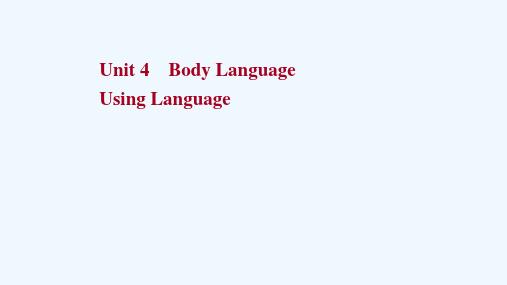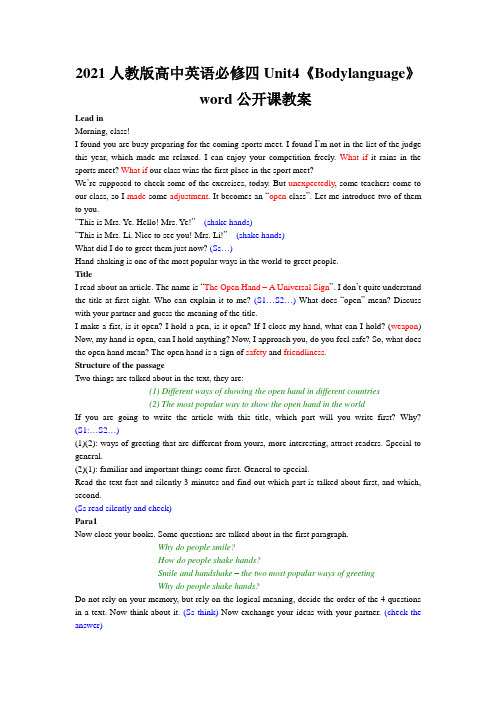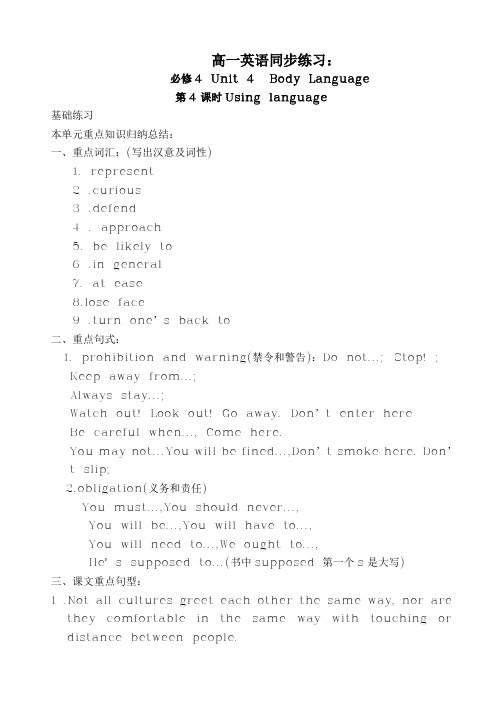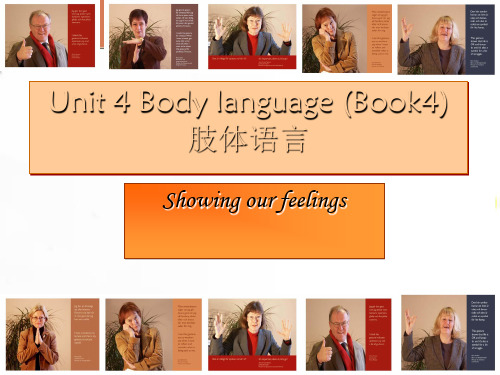2020_2021学年新教材高中英语UNIT4BODYLANGUAGESectionⅡLearningAboutLanguage课时作业含解析新人教版选择
人教版高中英语必修四 Unit4 Body Language reading 课件

Para1 Body language is one of the most powerful means of communication, often even more powerful than spoken language. People around the world show all kinds of feelings, wishes and attitudes that they might never speak aloud. It is possible to "read" others around us, even if they do not intend for us to catch their unspoken communication. Of course, body language can be misread, but many gestures and actions are universal.
but many gestures and actions are universal. Para7 With so many cultural differences between people, it is great
to have some similarities in body language. We can often be wrong about each other, so it is an amazing thing that we understand each other as well as we do!
Para7 With so many cultural differences between people, it is great to have some similarities in body language. We can often be wrong about each other, so it is an amazing thing that we understand each other as well as we do!
新教材2023版高中英语Unit4AdversityandCourageSectionⅡLearni

US, so he _h_a_s_m_a_d_e_ (make) great progress. ③The little boy is dirty from head to foot because he __h_as_b_e_e_n_p_la_y_i_ng__
肯定句:主语+have/has+been+现在分词+其他。 否定句:主语+have/has+not+been+现在分词+其他。 一般疑问句:Have/Has+主语+been+现在分词+其他? 特殊疑问句:疑问代词/疑问副词+have/has+(主语+)been+现在分词+ 其他? ①He is ill. He's been lying in bed for three weeks. 他病了。已经卧床三个星期了。 ②Your eyes are red. Have you been crying? 你眼睛红了。你是不是一直在哭?
Section Ⅱ Learning About Language
Part 1课堂提升素养 1(教材P40)Unfortunately, his application was turned down because he was too young and not qualified enough. 不幸的是, 他的申请被拒绝了, 因为他太年轻, 资历不够。
(live) there since then. ④Jim _h_as__be_e_n_p_h_o_n_in_g_ (phone) his grandparents every night for the past
2021_2022学年新教材高中英语Unit4BodyLanguageUsingLanguage课件

18. _in__q_u_ir_e_into the problem
调查问题
19. _u_lt_i_m_a_t_e_ly_conclude 最终得出结论
20. _a_d_j_u_s_t class activities 调整课堂活动
21. Iron _r_e_a_c_ts_with water
铁和水发生反应
student (2) _t_ic_k_. It is easy to (3) r_e_c_o_g_n_i_s_e(识别)when students are interested in a lesson through their body language. If I find students are (4) _a_m_u__se_d_by something else, I will (5) _r_e_m_i_n_d_them to pay attention in class. It is hard to (6) _d_is_t_in__g_u_is_h_(辨 别)when students are troubled. If they have (7) _c_o_n_f_li_c_ts_with other students or at home, I will (8) _in__q_u_ir_e_and assess what is going on. Their body language makes me know when to (9) _a_d_j_u_st_class activities, when to (10) i_n_t_e_r_v_en__e, and when to talk to students individually.
(4)Where is the text likely to be taken from? A. A social magazine. B. A science book. C. A research report. D. A health magazine. 答案: (1)~(4)CCDA
2021人教版高中英语必修四Unit4《Bodylanguage》word公开课教案

2021人教版高中英语必修四Unit4《Bodylanguage》word公开课教案Lead inMorning, class!I found you are busy preparing for the coming sports meet. I found I’m not in the list of the judge this year, which made me relaxed. I can enjoy your competition freely. What if it rains in the sports meet?What if our class wins the first place in the sport meet?We’re supposed to check some of the exercises, today. But unexpectedly, some teachers come to our class, so I made some adjustment. It becomes an “open class”. Let me introduce two of them to you.“This is Mrs. Ye. Hello! Mrs. Ye!”(shake hands)“This is Mrs. Li. Nice to see you! Mrs. Li!”(shake hands)What did I do to greet them just now? (Ss…)Hand-shaking is one of the most popular ways in the world to greet people.TitleI read about an article. The name is “The Open Hand – A Universal Sign”. I don’t quite understand the title at first sight. Who can explain it to me? (S1…S2…) What does “open” mean? Discuss with your partner and guess the meaning of the title.I make a fist, is it open? I hold a pen, is it open? If I close my hand, what can I hold? (weapon) Now, my hand is open, can I hold anything? Now, I approach you, do you feel safe? So, what does the open hand mean? The open hand is a sign of safety and friendliness.Structure of the passageTwo things are talked about in the text, they are:(1) Different ways of showing the open hand in different countries(2) The most popular way to show the open hand in the worldIf you are going to write the article with this title, which part will you write first? Why? (S1:…S2…)(1)(2): ways of greeting that are different from yours, more interesting, attract readers. Special to general.(2)(1): familiar and important things come first. General to special.Read the text fast and silently 3 minutes and find out which part is talked about first, and which, second.(Ss read silently and check)Para1Now close your books. Some questions are talked about in the first paragraph.Why do people smile?How do people shake hands?Smile and handshake – the two most popular ways of greetingWhy do people shake hands?Do not rely on your memory, but rely on the logical meaning, decide the order of the 4 questions in a text. Now think about it. (Ss think) Now exchange your ideas with your partner. (check the answer)The most popular way to show the open hand in the worldSmile and handshake – the two most popular ways of greetingWhy do people smile?Why do people shake hands?How do people shake hands?Now read paragraph1 carefully and silently for 2 minutes and find out 3 sentences to answer the three questions. One sentence for one question. (check the answers together)Some sentences have similar structures? Can you find them?What if…? What if…? What if…?We have to…, and we have to…It shows that…, and that…Repetition makes the meaning stronger, but they may not be the key sentence. And it is necessary to tell the key sentence from the supporting details.How do you understand some expressions in this paragraph?Stranger: someone we don’t knowUnfamiliar place: place we haven’t been to or know little aboutTrust: believe in, rely onBe armed (with): be equipped with weaponPractice explaining the meaning of the expressions. Aloud. (Ss practice. Cross out the explanation and practice together again)Para2Although handshake is widely used in the world, people in some Asian cultures do not always touch another person. So, how can they show their open hand? Please work together with your desk mate to find out how they greet people.ChineseJapaneseHinduMuslimYoung people in the west(Ask a group of Ss to demonstrate one by one. After one student’s demonstration, explain.) Chinese: Wrong! The textbook is not always correct. 作揖hand, mouse, earJapanese: slightly – a little, if the person is unfamiliar, if the person is important.Hindu: hands not too low, “bow” not “nod”Muslim: students more familiar, now only touch heartYoung people in the West: five fingers, Give me five!, support and victoryLet’s practice!Class, stand up! Turn around and face your desk mate. I’ll tell you where you are from, and you perform.1.both of you are from India2.both of you are Muslims3.both of you are young people in the West4.look at me, this one (left hand) is from china and this one is from JapanAre there any problems? If you are from different countries, maybe you’ll have to make adjustmentNow I’ll make the greetings and you explain how people from different cultures greet. Read out the sentences in the text aloud, please. (Do the movement, Ss explain)Although the body language is different, they have something in common. What do they have in common?If you look at the first sentence and the last sentence, you will find the first sentence tells the difference, and the last sentence tells the same meaning. (Opinion–supporting details-conclusion)Body language – differentCarried meaning – the sameDiscussionWhat can we do to avoid misunderstanding caused by ways of greeting between people from different cultures? (Discussion or S1…S2…)What can we do to avoid misunderstanding caused by waysof greeting between people from different cultures?Be friendly and understanding.Always wear a smile when greeting, for its something universal.Combine spoken language and unspoken language to communicate better.Learn more about cultural difference and make adjustment whenever necessary.My suggestion for leaning body language is thatWhen you see an English film or talk with native speakers,observe their facial expression and gestures. Keep a recordof what interests you most. Watch what people do as wellas what they say. You can learn more from actions than youcan from words.Bb designThe Open Hand – A Universal SignWhat if…? What if…? What if…? What if…?We have to…, and we have to…unexpectedlyIt shows that…, and that…make adjustmentopenweaponsafetyfriendliness。
新人教版高中英语必修4Unit 4 Body Language Using language(含答案)

高一英语同步练习:必修4 Unit 4 Body Language第4课时Using language基础练习本单元重点知识归纳总结:一、重点词汇:(写出汉意及词性)1. represent______________2 .curious _______________3 .defend______________4 . approach ______________5. be likely to______________6 .in general______________7. at ease ______________8.lose face ______________9 .turn one’s back to______________二、重点句式:1. prohibition and warning(禁令和警告):Do not...; Stop! ;Keep away from...;Always stay...;Watch out! Look out! Go away. Don’t enter hereBe careful when..., Come here.You may not...You will be fined...,Don’t smoke here. Don’t slip;2.obligation(义务和责任)You must...,You should never...,You will be...,You will have to...,You will need to...,We ought to...,He’s supposed to...(书中supposed 第一个s是大写)三、课文重点句型:1 .Not all cultures greet each other the same way, nor arethey comfortable in the same way with touching or distance between people.1. 各种文化背景下的人互致问候的方式不尽相同,身体接触和相互间距的程度也不尽相同。
高中英语 Book4 Unit4body language 说课课件 新人教必修4(通用)

1). Analysis of the teaching material 教材分析
The type of this class is an extensive reading class, which plays an important part in developing students’ reading ability. So,during the teaching process, the teacher should focus on developing the students’s reading ability by extensive reading, and get them to learn some reading skills such as skimming, scanning and so on. Moreover, the students should receive some moral education, let them know more about body language in cultures in different countries.
课前探索(Pre-class Exploration):
Let students search for more information about body language which shows different meanings in different cultures and countries.
掌握该部分的重点词句
3.Let students read and understand the passage “Showing our feelings”.
让学生读懂本篇文章
Teaching difficult points (教学难点)
【高考推荐】2020-2021高考英语一轮基础梳理与练习Unit4Bodylanguage(含解析)新人教版必修4
Unit 4 Body language李仕才【短文语法填空】Chengdu has been making a name for itself in Western countries in recent years,as the city has moved to 1. (strength) its cultural exchanges with the rest of the world.Chengdu Week 2. (host) in Madrid in January as a major activity of the 2017 Happy Spring Festival in Spain, 3. is an annual event held by the Chinese embassy in Spain to celebrate 4. traditional Spring Festival holiday with overseas Chinese, locals and other visitors.It was the first time that the Chinese embassy had 5. (patient) introduced a city to the traditional Lunar New Year celebration.During the festival, classic regional art forms such as paper cutting, shadow plays and face changing opera performances were 6. display at the famous Plaza Mayor in Madrid.“The performances(表演) are so 7. (amaze) that I want to buy a ticket to Chengdu right now,” said Manuela Carmena, mayor of Madrid, during the event.Mayor Carmena said that the two cities shared 8. (similar) in many aspects and she hoped two cities could have 9. (far) exchanges than before in tourism and culture.Chengdu has become more closely tied to Spain since a direct flight between Madrid 10. Chengdu was launched on December 17.【解题导语】近年来,成都通过文化交流,大大提升了在世界上的影响力。
2020_2021学年新教材高中英语Unit4BodyLanguagePeriod3UsingLan
Second Listening
Activity1 Listening for details Listen to the conversation about body language. Then answer the following questions. 1. How did the man get the idea of using gestures to communicate? __________________________________________________________________________ 1. What did the police leader tell his team by using gestures? __________________________________________________________________________ 1. What did the woman say about the acting classes that she has been taking? __________________________________________________________________________
Lead-in
Look at these pictures and tell what they are communicating.
1. The man frowns and have tightly-shut eyes, which shows that he may be in great pain. 2. The boy crossed his fingers. Maybe he is hoping for good luck. 3. The woman in the photo is either deaf or communicating with her husband who is deaf. Her sign means “I love you.” 4. The two children seem quite happy. Perhaps they have just won a table tennis match.
2021_2022学年新教材高中英语课时素养评价十一Unit4BodyLanguageLearnin
十一Unit 4 Learning About LanguageⅠ. 单句语法填空1. After thinking(think) for some time, I finally made up my mind to give up.2. Her job is keeping (keep) the lecture hall as clean as possible.3. Mr Reed made up his mind to devote all he had to setting up(set up)some schools for poor children.4. The argument is very convincing(convince).5. Keep on trying (try) and you will succeed.6. He had a terrific sense of humour and could be very amusing (amuse).7. Though it sounds a bit too expensive, it is worth buying(buy).8. He remained standing(stand) beside the table.9. She is very busy writing(write) her papers. She is far too busy to receive(receive) callers.Ⅱ. 完成句子1. Would you mind turning down your puter a little, please?请把你的电脑(音量)关小一点好吗?2. Her job is washing, cleaning and taking care of the child.她的工作是洗衣服、打扫卫生和照顾孩子。
新教材高中英语Unit2AboutLanguage学案含解析新人教版选择性必修第四册
新教材高中英语学案含解析新人教版选择性必修第四册:Unit 2 Iconic AttractionsSection ⅡLearning About LanguageⅠ.核心词汇及拓展1.________ n. 部长;大臣;外交使节2.________ n. 蛙;青蛙3.________ n. 箭;箭头4.________ n. 适合度假的地方5.________ n. 领域;领土;范围6.________ vt. 倡议;赞助;主办n. (法案等的)倡议者;赞助者7.________ n. 自由8.________ n. 高尔夫球运动9.________ n. 海峡10.________ n. 样本;样品11.________ n. 纪念碑(或馆、堂、像等);历史遗迹12.________ vi. & n.(过去式________,过去分词________)潜水;跳水;俯冲13.________ n.自由;不受……影响的状态→________ adj.自由的;无约束的vt.使自由;释放14.________ vt. 给……命名(或题名);使享有权利15.________ 高峰季节Ⅱ.核心词汇讲解1.freedom n.自由;不受……影响的状态free adj. 免费的;自由的;不受限制的vt. 解放;解救;使摆脱adv. 免费地keep...free from/of 使……免受(影响;伤害等);使……不含(有害物)be free of 不含……的;没有……的;不受……伤害/影响的free of charge/for free 免费set...free 释放/放走……free...from/of... 解放;使摆脱❶After 10 years in prison, he was given his freedom.他入狱10年以后又得到了自由。
❷We should keep ourselves free from drugs.我们应该远离毒品。
- 1、下载文档前请自行甄别文档内容的完整性,平台不提供额外的编辑、内容补充、找答案等附加服务。
- 2、"仅部分预览"的文档,不可在线预览部分如存在完整性等问题,可反馈申请退款(可完整预览的文档不适用该条件!)。
- 3、如文档侵犯您的权益,请联系客服反馈,我们会尽快为您处理(人工客服工作时间:9:00-18:30)。
课时作业14[基础检测]单句语法填空1.We made the right choice.It's fun spending (spend) the holiday at the beach.2.She spent four weeks which she could afford touring (tour) around the country,promoting her new album.3.He has admitted not_keeping (not keep) his word,which makes others unable to believe him any more.4.I regret not_spending (not spend) more time with my grandma before she passed away.5.Try pressing (press) the green button to see if the machine will start.6.The thief drove as fast as he could to escape being_caught (catch) by the police.7.The young trees we planted last week require looking (look) after with great care.8.Doing nothing is doing(do) ill.9.His speech was very inspiring (inspire).10.Your task is cleaning(clean) the house carefully.[能力提升]Ⅰ.阅读理解In England recently three foreign gentlemen came to a bus stop and waited.About five minutes later, the bus they wanted came along.They were just going to get on when suddenly there was a loud noise behind them.People rushed onto the bus and tried to push them out of the way.Someone shouted at them.The bus conductor came rushing down the stairs to see what all the trouble was about.The three foreigners seemed all at_sea and looked embarrassed.No one had told them about the British custom of lining up for a bus that the first person who arrives at the bus stop is the first person to get on the bus.Learning the language of a country isn't enough.If you want to have a pleasant visit, find out as much as possible about the manners and customs of your host country.You will probably be surprised just how different they can be from your own.A visitor to India would do well to remember that people there consider it impolite to use the left hand for passing food at table.The left hand is supposed to be used for washing yourself.Also in India, you might see a man shaking his head at anotherto show that he doesn't agree.But in many parts of India a shake of the head means agreement.Nodding your head when you are given a drink in Bulgaria will most probably leave you thirsty.文章大意:文章以一个小故事作为开头,向我们介绍了英国人的乘车习惯,并进一步向我们介绍了不同国家肢体语言的内涵。
1.The British people tried to push the three gentlemen out of the way, because the gentlemen ________.A.were foreignersB.didn't have ticketsC.made a loud noiseD.didn't line up for the bus答案:D解析:细节理解题。
由第一段的“No one had told them about the British custom of lining up for a bus that...on the bus.”可知,英国人因为这三位外国人没有排队而将他们推到一边。
2.According to the article, if you want to have a pleasant journey in a foreign country, you should ________.A.learn the language of the countryB.understand the manners and customs of the countryC.have enough time and moneyD.make friends with the people there答案:B解析:细节理解题。
由第二段第二句话“If you want to have a pleasant...your host co untry.”可知,当我们到国外旅行时,应该对目标国的风俗有所了解。
3.What does the underlined phrase “at sea” probably mean?A.Tired. B.Disappointed.C.Pleased. D.Confused.答案:D解析:词义猜测题。
根据画线短语后的一句话可知,这三位外国人对英国的风俗并不知情,由此可知,当他们面对英国人当时的反应时会感到迷惑。
4.In India it is considered impolite to ________.A.use the right hand for passing food at tableB.pass food with the left handC.eat food with your handsD.help yourself at table答案:B解析:细节理解题。
由第二段的“A visitor to India would do well...left hand for passing food at table.”可知,在印度用左手递食物被认为是不礼貌的。
Ⅱ.完形填空When we want to tell other people what we think about, we can do it with the help of words or with the help of signs.We sometimes move our __1__ up and down when we want to say “__2__”, and from side to side when we want to say “no”.People, who cannot hear or speak, talk to each other with the help of their fingers.People who do not understand each other's language have to do the same.This story shows __3__ they sometimes do it.A man who could not speak __4__ was once in Canada.One day he went to a __5__ and sat down at a table.When the waiter came, the man opened his mouth, put his __6__ in it.He wanted to say, “Bring me something to eat.”The waiter soon brought him a cup of __7__.The man moved his head from side to side.The waiter understood him and __8__ the tea.In a moment he brought a cup of coffee and put it on the table.The man moved his head from side to side.He was very hungry but he did not want to drink.He __9__ his head when the waiter brought him a lot of __10__ drinks, but drinks are not __11__, of course.The man was about to __12__ when another man came in.When this man saw the waiter, he put his hand on his __13__.That was enough.In a few minutes, a large plate of meat and vegetables was brought in front of him.Now you may __14__, people can not understand the __15__ of signs so well as the language of words.文章大意:我们可以用话语告诉别人自己的所想,也可以用一些手势用语。
